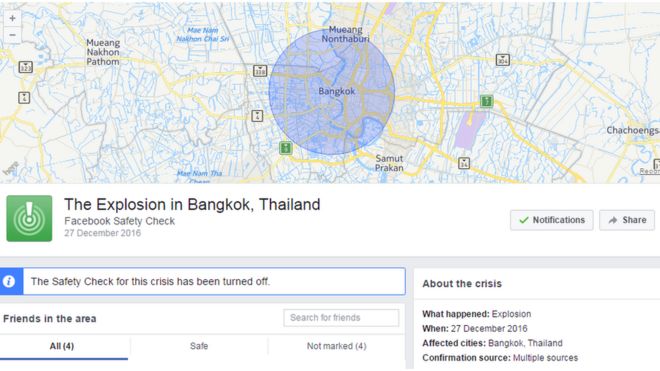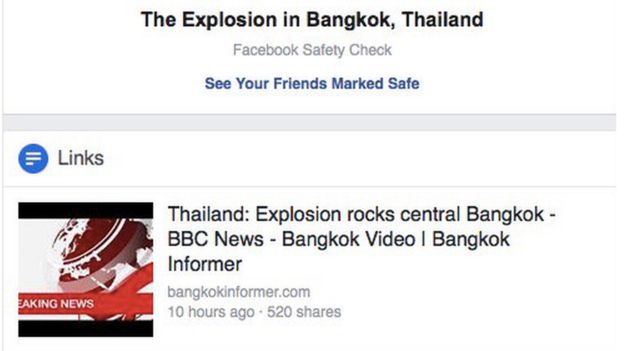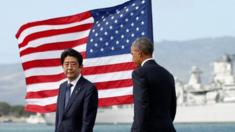- Dec 28, 2016 05H:52 GMT/UTC/ZULU TIME
- Asia
 FACEBOOK
FACEBOOK
Facebook users in Bangkok were falsely alerted to an "explosion" in the Thai capital, after the social network activated its Safety Check feature.
It allows Facebook users in danger zones to mark themselves as safe, but in this instance was triggered by a protester throwing firecrackers.
Facebook said it relied on a "trusted third party to confirm the incident".
But the way it was labelled misled many online as people started sharing false news of a blast.
Facebook has recently faced criticism for allowing fake news to proliferate.
- How can Facebook fix its fake news problem?
- The person who writes fake news to be shared on Facebook
The 'explosion' in Bangkok
On Tuesday, a protester threw small firecrackers at a government building in Bangkok (link in Thai).
According to Facebook, this triggered the Safety Check feature at about 21:00 local time which created a page titled "The Explosion in Bangkok, Thailand" and people started marking themselves as safe.
The page also pulled in a link from a website called bangkokinformer.com referencing a BBC breaking news video about an explosion in Bangkok, but the video was in fact taken in 2015 in reference to a blast at the Erawan shrine.
 @SAKSITHCNA/TWITTER
@SAKSITHCNA/TWITTER
The safety check feature was later deactivated.
How the false story spread: Jonathan Head, BBC News, Bangkok
The first I knew something was wrong was a stream of messages asking if I was ok, and spotting friends marking themselves as safe in Bangkok. By the time my colleagues had made efforts to get the erroneous post taken down, it had circulated widely, within minutes.
It turned out Facebook was generating an automatic request to people to declare themselves safe, so even experienced journalists, who would have realised the story was not genuine, inadvertently gave it some credence by responding to the Facebook prompt.
In a country so dependent on tourism any report of a suspected terrorist attack is a serious matter. The BBC and other reputable media take great care when reporting news of such incidents, stating only what we can already confirm.
The latest false post spread quickly partly because people instantly saw the BBC's distinctive news logo, and assumed it was reliable before they checked the real date - 17 August 2015.
This is a real problem for a journalist based in a country where we are under close scrutiny, and subject to criticism by government officials and Thai citizens for reporting in what is still a sensitive political climate.
'Community activated'
When Facebook first introduced the safety feature tool in 2014, it would activate the feature manually. In November, Facebook changed course and said it would now be activated "by our community".
Now, a third-party source alerts Facebook when an incident occurs. The social platform then searches to see if users in the area are discussing the incident.
If enough users are referencing the incident, those in the area are invited to mark themselves as safe.
According to Facebook, the title of the safety check is taken from the alert provided by the third-party source.
Asia
Japan PM makes landmark Pearl Harbor visit
- 27 December 2016
- Asia


No comments:
Post a Comment